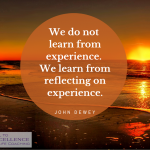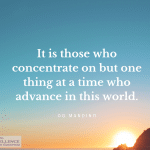
One of the biggest ways I waste time is by dithering over little decisions, like where to eat lunch, or what color shirt to buy, or whether to go to the gym or run outside. I’m not kidding – I can waste a crazy amount of time. It can reach ridiculous extremes, like spending so much time trying to decide whether it would be better to start cleaning in the kitchen or the bathroom (or maybe I should start in the office or living room???) that I could have cleaned my entire apartment by the time I finally get started.
What’s worse, while my brain is mulling over the pros and cons of salad versus sandwich versus pizza, it has no bandwidth to deal with weightier issues, like strategizing how to move closer to my big life goals.
I’m not much better with more important decisions, either, and I’ve missed opportunities because I spent too much time trying to make up my mind. Once, I spent months trying to decide whether I could fit volunteering with a local animal shelter into my schedule. By the time I decided I could make it work, the shelter was overloaded with volunteers and had stopped taking applications.
For a long time, I thought it was just one of my quirks. But then I discovered there was a name for this phenomenon of getting stuck for too long in the decision-making process: Analysis Paralysis. According to Wikipedia, analysis paralysis is “the state of over-analyzing (or over-thinking) a situation so that a decision or action is never taken, in effect paralyzing the outcome.”
Apparently, it’s pretty common in individuals, and also in organizations. And, it’s a common contributor to the feeling of overwhelm.
According to Kathi Lipp and Cheri Gregory, authors of “Overwhelmed: How to Quiet the Chaos and Restore Your Sanity,” there are four basic personality types, and each type experiences overwhelm differently, with distinct triggers. (1) Analysis paralysis is a characteristic overwhelm trigger for “Analytic” personalities, who find it difficult to make decisions when they don’t have all the information they want. Having too many options, searching for the “perfect” choice, or being afraid of making the “wrong” decision can also contribute to getting stuck in a decision-making loop.
This describes me to a “T”. When I’m faced with a decision, whether big or small, I have this notion that there is a “right” or “best” choice. I want to analyze my options from every single possible angle, and project the consequences of each possible choice into the future, so that I make the absolute best possible decision that will enable my long-term success, happiness, and fulfillment.
While this type of mental processing may make sense for major life decisions, like choosing a career path or a spouse, it’s probably overkill when trying to decide between Subway and Schlotzky’s.
(In case you’re curious, the other personality types Lipp and Gregory describe are: “Expressives”, who can become overwhelmed by boredom or painful activities; “Drivers”, who can become overwhelmed when life gets out of control or they don’t meet their goals; and “Amiables”, who can become overwhelmed by conflict or pressure from other people. We’ll discuss these contributors to overwhelm in future posts.)
So, if you’re prone to analysis paralysis like me, the good news is that there are several strategies to break through the inertia and get ourselves moving again.
1. Match Your Time Investment with the Level of Importance of the Decision
When you find yourself overthinking a decision, ask yourself how important this decision really is, and how much the answer will impact your life. Then, determine an appropriate amount of time for ruminating. Don’t waste mental energy on small, insignificant decisions, but don’t shortchange major decisions either (the opposite extreme of analysis paralysis is “extinct by instinct”, or making rash, impulsive decisions with too little thought).
Once I became aware of the amount of time I was wasting on trivial decisions, it was like a light bulb went on, and I could see how silly it was. I realized most of these decisions didn’t matter at all, and that alone was enough to break me out of the habit. Now, decisions like where to eat lunch or start cleaning get 5 minutes max, and usually I’ll just go with the first thing that pops into my mind. The answer doesn’t really make a big difference.
For bigger decisions that require some investigation, try setting a time limit for the research you need to make a decision. This can also help you to become more efficient and keep your from going too far down irrelevant rabbit holes. Make a list of the specific information you need, seek it out, and ignore everything that is unrelated or redundant. Recognize that for most decisions there will always be some unknowns, so decide in advance how much information is enough. Once you reach that information threshold, make your decision.
2. Automate and Eliminate the Need for Decisions by Building Habits
Decisions use up mental energy, and our brains have a limited reserve of mental energy that must be replenished each day. Overloading the brain with too many decisions leads to “decision fatigue” – a state where our brain is exhausted and our ability to make decisions is reduced.
A widely cited study examined the decisions of a panel of parole board judges over a period of 10 months, including over 1100 cases. (2) The researchers found that the judges were more likely to grant parole early in the morning, or right after a break, but as they became tired and “decision fatigue” set in, they were more likely to fall back on the default option, which was to deny the application for parole.
Habits are the brain’s way of reducing its workload, cutting down on the amount of energy it has to devote to decision-making each day. If you find yourself spending a lot of energy every day on small or trivial decisions, see how many you can put on autopilot by developing appropriate routines or habits. For example, instead of wasting time debating where to start cleaning, I’m developing a cleaning “routine” that I follow each and every time so no thought is involved (interestingly, this is how professional maid services train their employees). The more trivial decisions you can eliminate with routines, the more mental energy you’ll have for the big, life-changing decisions.
To learn more about easy and effective ways to create new habits, check out my articles on Kaizen and Microresolutions.
3. Choose to Make Your Decision the “Right” Decision
The truth is, for many of the decisions we make in life there is no “correct” or “perfect” choice. Instead, we choose between different paths, each with a distinct set of pros and cons. If we hold onto the mindset that there is a “right” choice, it’s easy to get sucked into a cycle of second-guessing our decisions, regretting our choices, and imagining what life would have been like if we had made a different choice. In reality, we would get stuck in this loop no matter which choice we made, because the “perfect” choice is only an illusion.
According to Ed Batista of Stanford Business School, “we overemphasize the moment of choice and lose sight of everything that follows. Merely selecting the ‘best’ option doesn’t guarantee that things will turn out well in the long run, just as making a sub-optimal choice doesn’t doom us to failure or unhappiness. It’s what happens next (and in the days, months, and years that follow) that ultimately determines whether a given decision was ‘right.’” (3)
It’s much more productive and empowering to instead commit to our decision, and resolve to make it the “right” choice. This means committing to doing the work and dealing with the challenges, in order to make the path we’ve chosen successful. Making a career or business or relationship work takes intentional effort. Know that the other paths wouldn’t have been easier, they just would have held a different mix of problems, challenges, and rewards. Have confidence in yourself and your decision. Look forward, not back.
At the same time, if you start going in one direction and give it your all, but it becomes clear that this was the “wrong” choice (for example, a job that turns out to conflict with your core values, or a relationship that diminishes and devalues you), change directions. Recognize that you have the power to choose a different path, at any time. Decisions have consequences, but they don’t have to be final.
4. Break Big Decisions into a Series of Smaller, Incremental Decisions
Very few of the choices we make in life are all-or-nothing decisions. Most of the time, there’s room for evolution and flexibility.
For example, we put immense pressure on ourselves to choose a career, as if it was a single choice that we will have to live with for the next 40-50 years. In reality, we’re choosing a starting point and general direction. Our actual career will evolve throughout our life, taking shape and shifting as we switch jobs, gain knowledge, develop new skills, experience changes in our priorities, and discover new interests.
We can relieve a lot of the pressure we put on ourselves by seeing big decisions like this as a series of smaller decisions that give us a chance to explore different options, evaluate our results, and base our next step on the previous feedback.
As an illustration, when I was training to become a life coach, I received a lot of advice to “define my niche” and “describe my ideal client” in minute detail right away. Honestly, it paralyzed me. How was I supposed to know who and what I wanted my specialty to be before I even started?? Thankfully, I found other mentors who taught me that it was okay to explore and try out different niches to see how they fit, and to explore different ideas and interests in my writing to see what resonated with both me and my readers the most. I didn’t have to decide everything at once. And even more importantly, I could have fun with the process of learning and discovering.
So, when you find yourself feeling the pressure of a big life decision, look for ways to approach it in steps. Thinking about a career change? See if you can shadow someone in the new field you’re considering for a day or two, or find a way to do that kind of work part-time or in a volunteer capacity. Take a class or two before committing to a degree program. Test the waters. Experiment. Enjoy the process.
Hopefully these strategies will help you break free from analysis paralysis, keep you moving steadily forward, and eliminate one more source of overwhelm from your life. If you have any additional tips that you’ve found helpful for breaking the cycle of endlessly overthinking decisions, please share in the comments section below!
References
(1) Lipp K and Gregory C. Overwhelmed: How to Quiet the Chaos and Restore Your Sanity. Harvest House Publishers: 2016.
(2) Danziger S, Levav J, Avnaim-Pesso L. Extraneous factors in judicial decisions. PNAS 2011;108(17)6889-6892.
(3) Kane, B. The Science of Analysis Paralysis: How Overthinking Kills Your Productivity & What You Can Do About It. July 8, 2015. Available at: https://blog.todoist.com/2015/07/08/analysis-paralysis-and-your-productivity/







16 thoughts on “4 Strategies to Conquer Analysis Paralysis”
Ooh, I used to suffer with analysis paralysis without even knowing 🙂 Haha, I still know people who do 🙂 No seriously, this is such and insightful and helpful post! I especially love the tips who’ve highlighted in dealing with this issue – #3 is amazing and powerful – choose to make your decision the right decision, how freeing. Thanks so much for this inspirational post x
You are welcome! Tip #3 is definitely powerful – choosing our perspective allows us to shape our experience!
This is such sage advice for those of us who are “sitting on” a decision. The bite-sized tips you provided are practical, actionable and distresses the overwhelm response. Ingenious tips to get out of paralysis and functional again =). Nice job!! Xo Evelyn
Thank you! I’ve found that breaking down actions into simple, bite-size steps is usually the best way to short-circuit overwhelm, no matter what the cause 🙂
Oh my gosh, I do this so much. I didn’t even realize it was an issue much less that it has a name! But it makes so much sense now that I think about it. Thank you so much for writing this!
You’re welcome! Glad you found it helpful!
I face the similar problem most of the times where I am unable to decide what to do next. This post will be really helpful to me. Thanks for sharing
Great! So glad you found it helpful. Hopefully this will help you to keep moving steadily forward!
I can relate to your examples that you have indicated in the introduction. Sometimes we waste too much time to decide small things, such as what to eat or what to wear. I have seen people around me are having such issues and I am pretty sure they needed to read about your articles. At least they needed to realise that it is actually an issue that they needed to fix.
Awareness of what we are doing is key – from there we can decide whether it is something we want to change or not 🙂
I can never make up my mind about anything . It can get really annoying sometimes . I think sometimes it is due to my lack of focus . I believe if I follow these steps that you have here ; I will be able to focus and make decisions and stick to them . That way everything won’t seem so overwhelming .
Yes, if you know what your goal or focus is, the decision-making process becomes much easier – the choice either works toward or against your goal, and that creates clarity. If you are struggling with focus, it can help to take some time to really think about your goals, to create a vision of what you want your life to look like, and to do an inventory of your most important values and needs.
These are really great tips. This is something I used to struggle with but feel I have got a lot better. I think I may even need to slow the process down sometimes as I can occasionally be a bit too hasty committing to something, especially with friends, then later realising I probably don’t have enough time ????
Ah, yes, it’s all about finding that happy middle ground 🙂
I love that quote indecision becomes decision with time. Especially when you require some movement from your relationships. When a person doesn’t respond, thats a decision
That is such a great point – many of our relationships do also represent decision points!